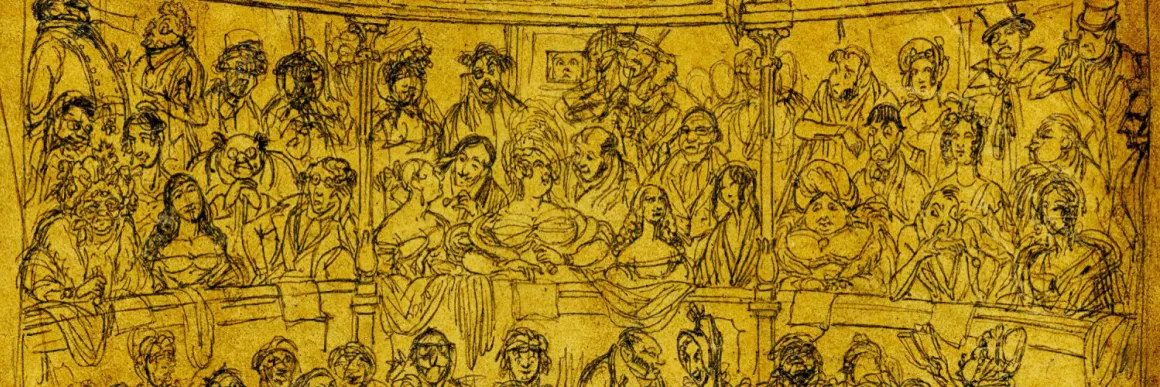This special issue of Romantic Circles Pedagogies extends a conversation about teaching Romantic drama that has been a part of the larger reevaluation of Romantic-era drama and theatre over the past fifteen years or so. While there have been many scholarly publications, conference panels, and digital and print dramatic publication initiatives to advance work in British theatre and drama studies of the Romantic era, most of the conversation about teaching Romantic drama has been a matter of occasional collegial sharing and listserv posting. It seemed a good time to develop a special issue that would illustrate the many different ways of framing curriculum, working out instructional ideas, and engaging students with British Romantic theatre and drama in ways suited to different programmatic and curricular contexts.
Abstract
In spring 2007, I taught a special topics course at Shippensburg University with the same title as this essay. In the course, I examined with students both the dramatic writing of women writers of the British seventeenth through twentieth centuries and the meta-historical questions raised by the course’s title. In the following remarks, I suggest some of the directions that I tried in the course and some of the ideas I would try in the course after seeing how the students responded.
Teaching the Teachings of the Stage: A Graduate Seminar on Restoration to Romantic Drama
Emily Hodgson AndersonAbstract
This essay addresses two questions that motivated the design of my new graduate seminar: why I extended the survey to include romantic drama, and why I believe romantic drama is particularly suited to a discussion of the pedagogical process.
Abstract
Even after directing a dozen full productions of the plays of the Romantic period, I continue to alter my teaching of production and performance with each new play. One reason for change is that each play brings its own peculiar set of demands on the cast. Another reason for change is that each new cast brings a different set of talents to be developed. A third factor is my own evolving attention to the characteristics of period acting.
Abstract
This exercise consists of two parts: a take-home assignment (about 25 minutes), and an in-class movie screening, followed by classroom discussion (50 minutes or more). Students are to compare their own seemingly objective responses to John Keats’s “La Belle Dame sans Merci” with filmmaker Hidetoshi Oneda’s short adaptation of the poem (for more information, see http://www.celophaine.com/lbdsm/lbdsm_top.html).
Abstract
Several years ago I offered a graduate seminar in Romantic period drama, basing my choice of plays on Jeffrey Cox and Michael Gamer’s Broadview Anthology of Romantic Drama, which had recently appeared, as well as Peter Duthie’s edition of Joanna Baillie’s Plays on the Passions. I wanted to offer a broad range of plays to span the sublime-ridiculous axis within a fairly tight time span.
Staging the 18th-Century Prostitute for the 21st-Century: A Dramaturgical Approach to Teaching Cowley’s The Belle’s Stratagem
Melinda C. FinbergAbstract
In most theater survey or dramatic literature classes, plays are treated as literature. The term “dramaturgy” never comes up, either as a theatrical discipline or as a critical tool for helping our students understand drama. I propose changing this situation, and I will use Hannah Cowley’s comic masterpiece, The Belle’s Stratagem (1780), to demonstrate how looking at plays from a dramaturgical perspective can provide both students and teachers with a more dynamic relationship to Romantic dramatic texts.
Abstract
“Holy Theatre” is a term known to drama students and theatre practitioners primarily from Peter Brook’s treatment of it in his 1968 classic, The Empty Space. It is, Brook says, “the Theatre of the Invisible – Made – Visible” (42); it is the kind of theatre that arises from a deeply felt urge to “capture in our arts the invisible currents that rule our lives” (45).
Abstract
In the past two decades, scholarship on British Romantic drama has illustrated the centrality of theater to understanding the era’s “geo-historical and geo-political” issues, and to appreciating women writers’ previously unacknowledged roles in public debates (Purinton, “On Teaching” 353). Key among these geo-historical and geo-political issues was the French Revolution. The dramatic events of the French Revolution shaped British Romantic writers’ thinking on social justice campaigns such as democracy, women’s rights, and abolitionism.
Abstract
After more than a decade of recovering and recontextualizing Romantic drama in Great Britain, we have come to recognize the central role that drama played during the period. Romantic drama, staged and read, was its culture’s most popular medium, crossing class, national, and gender divisions, as well as a serious literary form written by the period’s major writers.

